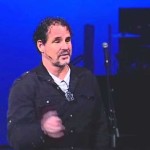We run our website the way we wished the whole internet worked: we provide high quality original content with no ads. We are funded solely by your direct support. Please consider supporting this project.

Is Longing for Justice Inconsistent with Love? A Response to Paul Copan (#3)
In a paper delivered at the Evangelical Theological Society in November, Paul Copan spent a good amount of time arguing that aspects of the NT conflict with the understanding of love that I espouse in Crucifixion of the Warrior God (CWG).
For example, Copan cites the parable Jesus told in Luke 18:1-8 about a widow who wouldn’t leave a certain unjust judge alone until he heard her case, because she wanted justice against her opponent. Similarly, Copan cites Revelation 6:9-10 which depicts martyrs crying out to God, asking him, “how long will it be before you judge and avenge our blood on the inhabitants of the earth?” And in Revelation 18:20 the saints are told to rejoice because God has judged Babylon. Copan argues that this longing to see wrongdoers punished and this rejoicing when they are judged is inconsistent with the view of love I espouse in CWG.
In response, I don’t see how the longing for justice to be done in the face of evil conflicts with anything I say in CWG. Indeed, I think the moral center of every morally healthy human being longs for the moral scales of the universe to be balanced. The thought that those who inflict suffering on innocent people would never have to answer for it grates on our internal moral compass. This is what leads most people to feel that violence against wrongdoers is justified. Yet, Paul tells disciples of Jesus that we are to never repay evil with evil by taking justice into our own hands and retaliating. We are to instead leave all vengeance to God (Rom 12:17-19). Trusting that the Judge of the earth will right every wrong in the end, we are to surrender to God our impulse to carry out justice on our own. The material Copan cites simply expresses the longing for God to carry this out, and it conflicts with nothing I said in CWG.
One more very important point needs to be made, however. The longing to see justice done becomes vindictive and ungodly if it is not accompanied by an even more profound longing to see wrongdoers repent, receive forgiveness, and be transformed by the love of God into the likeness of Christ. Paul teaches that love believes the best and hopes for the best for everyone (Rom 13:7), and we are called to follow Jesus’ example when he prayed for the forgiveness of those who crucified him (Lk 23:34). This longing for the forgiveness and transformation of those who perpetrate evil doesn’t conflict with our innate longing to see justice done. It simply reflects the more profound hope of love that the judgment of evil doers wouldn’t be necessary.
But if love leads us to hope that judgment will be unnecessary, should we not be saddened when it is necessary? So how can the saints in Revelation be told to rejoice over the judgment that is falling on Babylon?
The answer is that throughout Revelation, Babylon symbolizes the political wing of Satan’s regime. It represents all the kingdoms of the world that are under the deception of the Beast and that therefore trust in military power rather than in the power of self-sacrificial love as embodied in the slain lamb and its followers. The saints in Revelation are thus not rejoicing over any actual human beings coming under judgment; they are rejoicing because the power-hungry way of trying to rule the world, which has caused such massive violence and suffering throughout history, has finally self-destructed. And this self-destruction is the just judgment of God.
Photo on VisualHunt
Category: General
Tags: Crucifixion of the Warrior God, Justice, Love, Paul Copan
Topics: Attributes and Character
Related Reading

Sermon Clip: Tough To Love
Learning how to love the people in our life that we find challenging to deal with is often very difficult. This week in Heart Smart Greg Boyd looks at some biblical examples and instructions on how to love our enemies in the same way we love our friends. Full Sermon Here: http://whchurch.org/sermons-media/sermon/tough-to-love

Sermon Clip: The Worst of Sinners
In this short clip, Greg Boyd discusses Paul’s definition of love. In the full sermon, Greg talks about how in this dog eat dog world, we’re programmed to judge others. But to love others with unsurpassable worth, we must ascribe worth to them at cost to ourselves. In this sermon, Greg talks about how to…

What God Requires
The reason we were created and what we are called to be is summed up in one word: love. The central defining truth of those who follow Jesus is that in Christ God ascribed unsurpassable worth to us, and thus the central defining mark of those who live in love is that they ascribe the…

Tribalism
Sandra Unger spoke for Greg while he was on vacation the week after the 4th. In this clip, Sandra explains whats tribes are and how that creates unintended separation between people. In the full sermon, she speaks about what it means to be part of the Jesus Tribe. She discusses the reasons people are prone to…

Will There Be A Launch Event for Crucifixion of the Warrior God?
In this episode Greg gives an update on book release plans for “Crucifixion of the Warrior God.” http://traffic.libsyn.com/askgregboyd/Episode_0038.mp3

The Risk of Love & the Source of Evil
On Sunday Greg tweeted the following: Love IS a tremendous risk. But if humans ever concluded the risk was not worth it, we likely become extinct rather quickly. … Yes, love is risky. It costs us everything, and we sometimes get terribly hurt. But it’s this risk that “makes the world go round.” … And…
